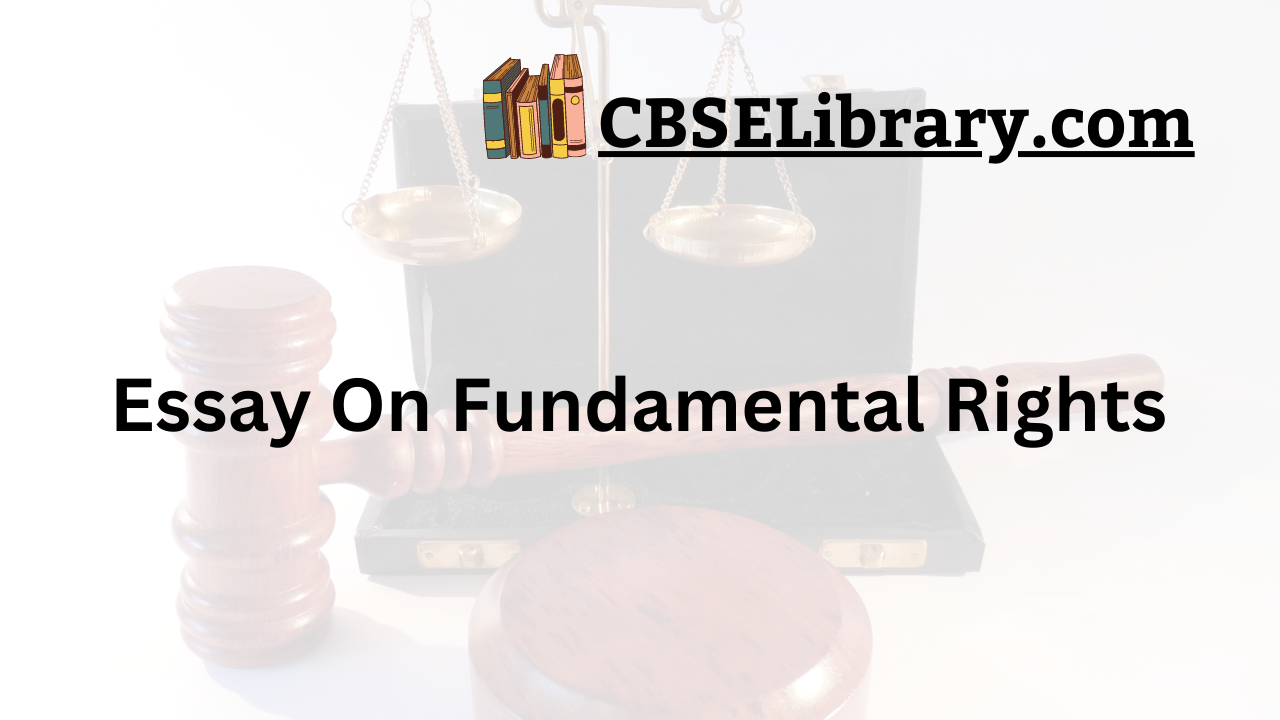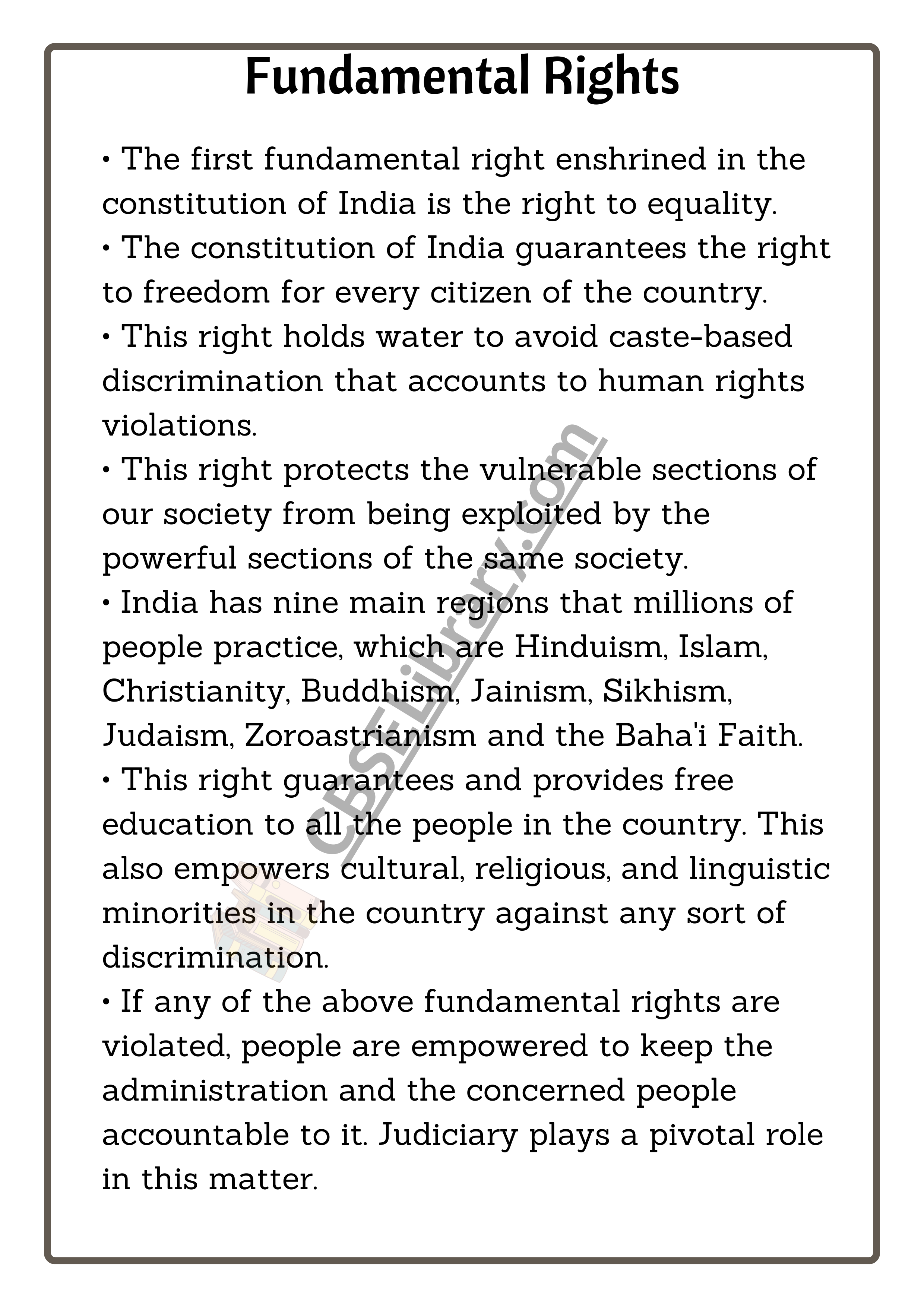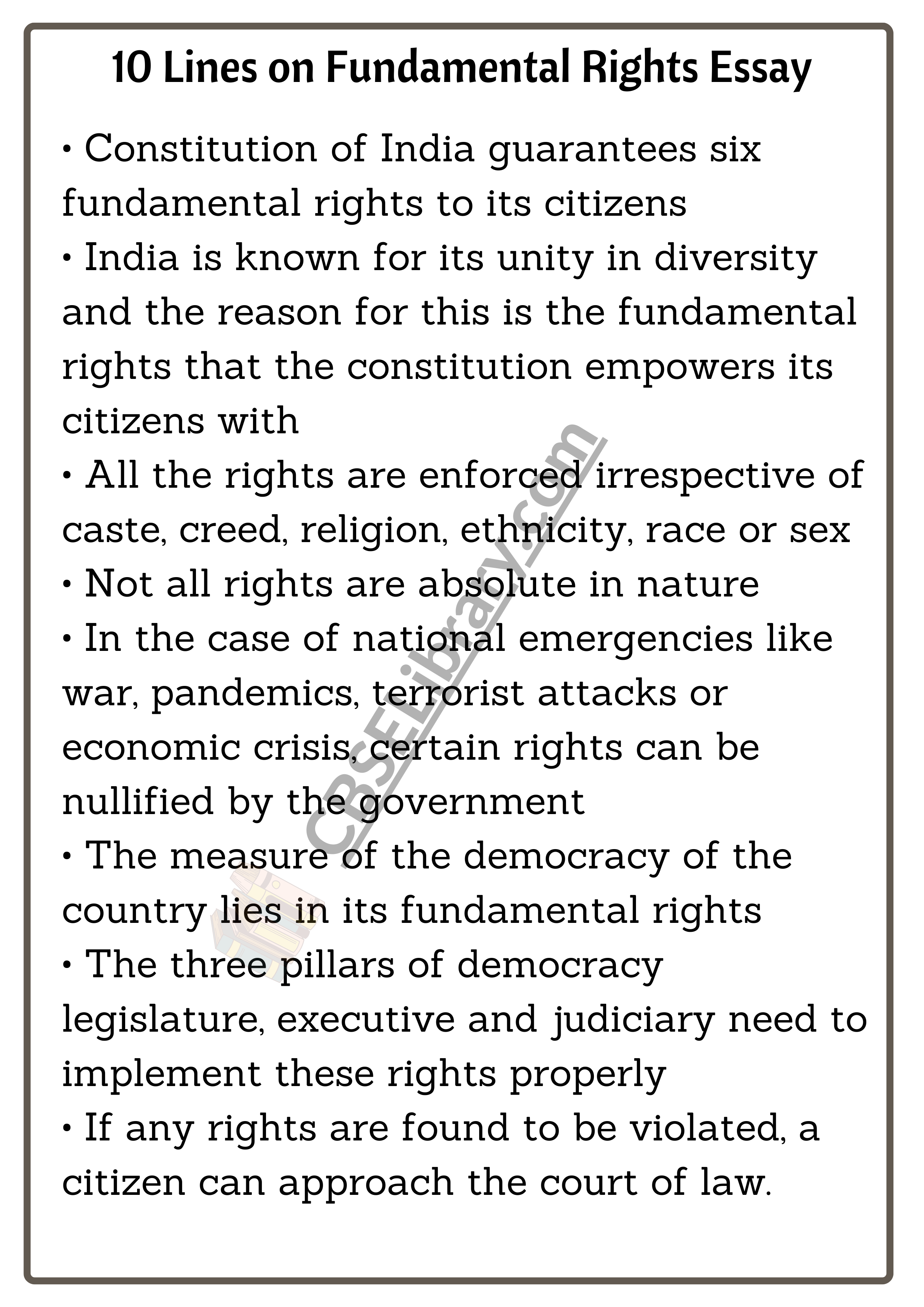Essay On Fundamental Rights: The constitution of India empowers its people with six fundamental rights, which are right to equality, right to freedom, right against exploitation, right to freedom of religion, cultural and educational rights and right to constitutional remedies. These rights are the basis on which the law and order of the country work.
Every citizen of the country, irrespective of caste, religion, colour, gender or sex has these basic rights. Although, most of these rights can be and will be suspended in case of a national emergency such as wars or pandemics.
In this essay on fundamental rights, we will be talking about each of the 6 rights and its significance to the country.
You can read more Essay Writing about articles, events, people, sports, technology many more.
Long and Short Essays On Fundamental Rights for Students and Kids in English
We have provided a 600-word long essay on fundamental rights in English for essay writing competitions and assignments. Also, you can find below a 200-word essay on fundamental rights in English for schoolchildren and students. Long Essay On Fundamental Rights is helpful to students of classes 7,8,9 and 10.
Long Essay on Fundamental Rights 600 Words in English
The true measure of the greatness of a country is analyzed through the effective implementation of the rights of its citizen. Every country awards certain rights (with limitations) to its citizens. A healthy administration is one that provides absolute rights and freedoms to the people, and India is one such country in the world. The constitution of India provides its citizens with 6 fundamental rights, based on which other rights are derived. The judiciary, the executive and the legislature are the custodians of the implementation of the fundamental rights guaranteed to the people of India.
The six fundamental rights are right to equality, right to freedom, right against exploitation, right to freedom of religion, cultural and educational rights and right to constitutional remedies. We are going to discuss all the fundamental rights in this particular essay on fundamental rights.
Right to Equality: The first fundamental right enshrined in the constitution of India is the right to equality. This particular fundamental right has special importance for a country as diverse as India. India has a mixed population with diversity in each and every sphere of life. There is diversity in religion, in language, in ethnicity, in the food we eat, in the clothes we wear and the movies we watch. From divisions of classes based on income to religion and caste and geographical locations, its a miracle on earth that a country as diverse as India has shown so much unity. And a huge amount of credit goes to the right to equality. This right provides and ensures equality to everyone in the eye of the law irrespective of caste, creed, gender, sex, religion or ethnicity.
Right to Freedom: The constitution of India guarantees the right to freedom for every citizen of the country. From the right to freedom of expression to the right to move across the country, this is an important fundamental right. But this is not an absolute right. A citizen is not supposed to hurt anyone in the name of the right to freedom. Violence and the use of arms nullify this right. Other rights that come under this category are freedom of association, freedom of movement, freedom to assemble, freedom to practice profession and freedom to reside anywhere in the country.
Right Against Exploitation: While there are class divisions across India, this right holds water to avoid caste-based discrimination that accounts to human rights violations. Certain practices that exist in India are untouchability and discrimination based on caste and religion. This right protects the vulnerable sections of our society from being exploited by the powerful sections of the same society. Human trafficking, prostitution, child labor or enslavement are some of the issues that right against exploitation protects people from.
Right to Freedom of Religion: India has nine main regions that millions of people practice, which are Hinduism, Islam, Christianity, Buddhism, Jainism, Sikhism, Judaism, Zoroastrianism and the Baha’i Faith. One aspect that needs to be clear is that this is that category of a fundamental right that makes our country secular in nature and democratic in values. There is a common misconception that India is a Hindu nation, which is not only false but a dangerous thought to the very secular fabric of our country and a threat to the democratic values of the constitution. Every religion has equal space in the country irrespective of the number of people following it. While certain countries have declared their official religion like Pakistan which is an Islam country, Nepal a Hindu country, or Irale a Jewish country, India is a country for all and that is the beauty of our nation. Every person and every community have the right to practice whichever religion they wish to without fear of backlash from any other community, or in a worst-case scenario, the administration itself. It is the administration’s responsibility that this fundamental right is implemented both in spirit as well in practice.
Cultural and Educational Rights: This right guarantees and provides free education to all the people in the country. This also empowers cultural, religious, and linguistic minorities in the country against any sort of discrimination.
Right to Constitutional Remedies: If any of the above fundamental rights are violated, people are empowered to keep the administration and the concerned people accountable to it. Judiciary plays a pivotal role in this matter.
Short Essay On Fundamental Rights 200 Words in English
Find below a short essay on fundamental rights in India is helpful to students of classes 1,2,3,4,5 and 6. This can be used by schoolchildren and college students for various academic purposes.
Constitution of India guarantees six fundamental rights to its citizens which are right to equality, right to freedom, right against exploitation, right to freedom of religion, cultural and educational rights and right to constitutional remedies. There are various other rights that come under the six mentioned fundamental rights like the right to freedom of expression, right to education, right to free speech or right to free movement within the country. Each of these rights should be and can be exercised without fear of backlash from anyone, by every citizen of the country. And it becomes the responsibility of the administration to make sure that these rights are not violated in reality.
But, responsible citizens need to remember that none of these rights is absolute in nature. If any crime or hatred or a threat to national security is found by people whilst making use of these rights, then the administration has the liberty to nullify the right to that particular person. For example, prisoners, enemies of the state, fraudster or people seriously accused in the court of law will have few of their fundamental rights nullified.
10 Lines on Fundamental Rights Essay
- Constitution of India guarantees six fundamental rights to its citizens
- India is known for its unity in diversity and the reason for this is the fundamental rights that the constitution empowers its citizens with
- The six fundamental rights are right to equality, right to freedom, right against exploitation, right to freedom of religion, cultural and educational rights and right to constitutional remedies
- All the rights are enforced irrespective of caste, creed, religion, ethnicity, race or sex
- Not all rights are absolute in nature
- In the case of national emergencies like war, pandemics, terrorist attacks or economic crisis, certain rights can be nullified by the government
- The measure of the democracy of the country lies in its fundamental rights
- Fundamental rights are usually not awarded to a citizen in authoritarian, dictatorship or fascist regimes, unlike the ones mentioned in the above essay on fundamental rights
- The three pillars of democracy legislature, executive and judiciary need to implement these rights properly
- If any rights are found to be violated, a citizen can approach the court of law.
FAQ’s on Essay On Fundamental Rights in India
Question 1.
Who is the father of the Indian constitution?
Answer:
B.R Ambedkar is the father of the Indian constitution.
Question 2.
Are the fundamental rights awarded to foreigners?
Answer:
Certain rights are awarded to foreigners except to people from enemy countries.
Question 3.
What is article 21 of Indian conditions?
Answer:
Article 21 gives the right to life under the Indian constitution to its citizens.
Question 4.
What are certain problems in implementing fundamental rights?
Answer:
Discrimination, untouchability, religion hatred are of the challenges in implementing the fundamental rights effectively.


